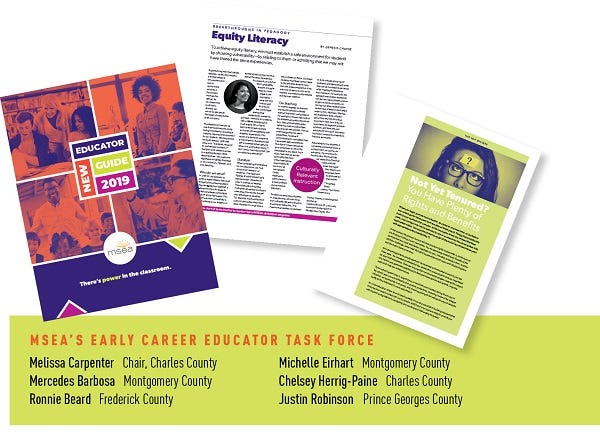MSEA’s Early Career Educator Task Force
We’re tackling the obstacles to a fun and rewarding early career

Classroom management, creating collegial relationships, establishing rapport with students, communicating with parents, finding a mentor, managing student debt, finding an affordable place to live. Early educators are faced with these tremendous challenges head-on in the first several years of their career.
That’s why members Mercedes Barbosa and Michelle Eirhart presented a new business item establishing an Early Career Educator Task Force to delegates at MSEA’s 2019 Representative Assembly.
“I’ve attended early career educator convenings with NEA and helped to start the New Educator Action Team( NEAT) in Montgomery County,” said Barbosa. “New educators are not getting the support or professional development that they need in order to stay in the profession and starting a statewide task force was the best way to move forward.”
Delegates unanimously supported the creation of the task force, which began its duties recently by confirming its focus on support, retention, advocacy, legislative advocacy, teacher training, and mentoring.
The formal charges of the taskforce are to:
Reach out to members with 1–10 years of experience to determine areas of concern, interest, and needs for professional development. Ideas include a regional listening tour to discover the gaps between teacher prep and the on-the-ground classroom experience.
Analyze the feedback from MSEA members, and research from other states’ programs, to prioritize areas for discussion, planning, and action, then determine opportunities and timeline.
Create professional development with MSEA staff, building on current programs and trainings.
Recommend the next steps to the MSEA Board of Directors for continuing support for new educators.
“The biggest themes we are seeing as the taskforce begins its work are support and opportunities for leadership for new educators,” said Justin Robinson, a National Board Certified lead teacher in Prince George’s County. “The support can and should come from the association, other new teachers, and seasoned educators. Early career educators should be able to learn how to lead in the profession either by advocacy for issues in their buildings or in legislation that affects education at large.”
With the passage of the Blueprint for Maryland’s Future, MSEA can make meaningful contributions to discussions about the implementation of new reforms. For early career educators, the new education funding promises a better, more formalized commitment to induction and mentoring programs — with programs designed by lead and/or master teachers, plus improved teacher salaries — all of which will require negotiating by local unions and boards of education.
“We’ll see success in our task force work and in the Blueprint when more early career educators remain in the profession, seek help and guidance from MSEA or their local association, and become advocates and leaders while in the beginning years of their career,” said Chelsey Herrig-Paine, an early career educator in Charles County.
“The longer our early career educators stay in the profession and work towards gaining that veteran teacher status the more success our students will have,” Herrig-Paine added. “Right now, not enough educators are staying which means that our students are losing out as well. They are losing out on fresh and effective educators who are learning how to teach this new generation of learners.”

